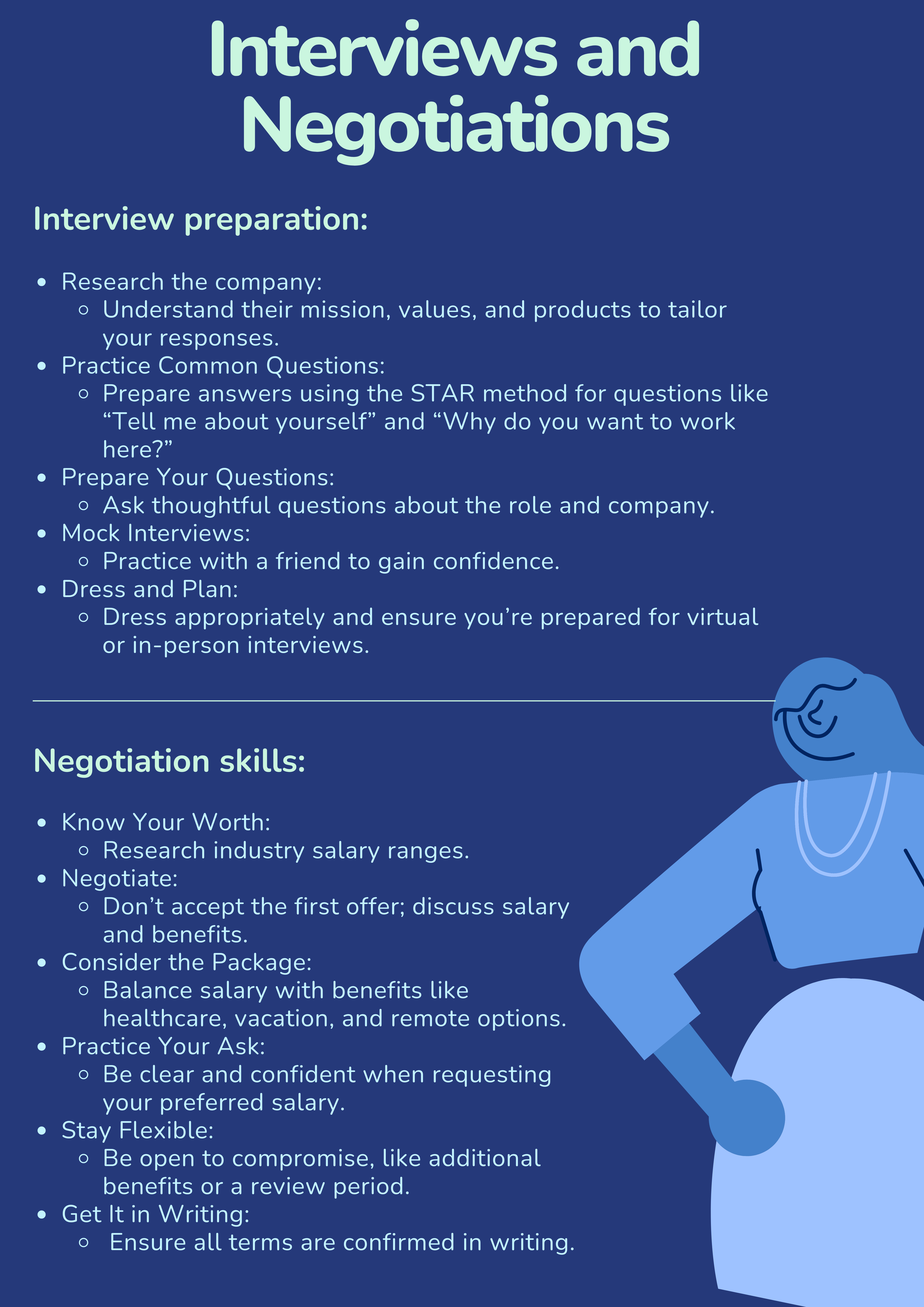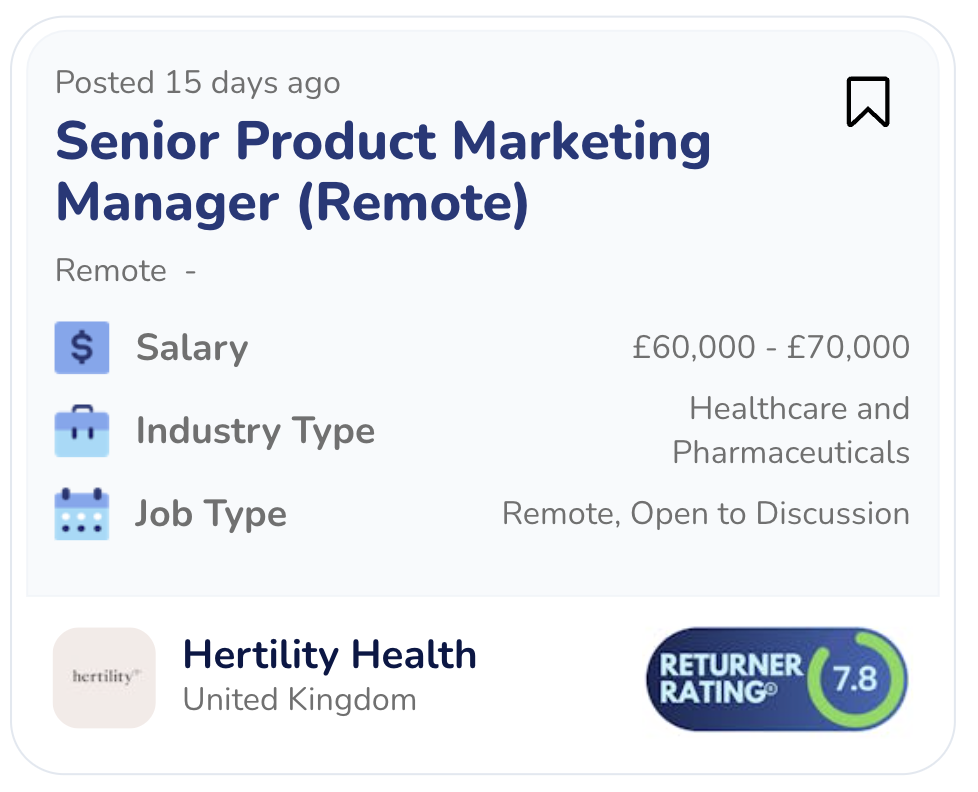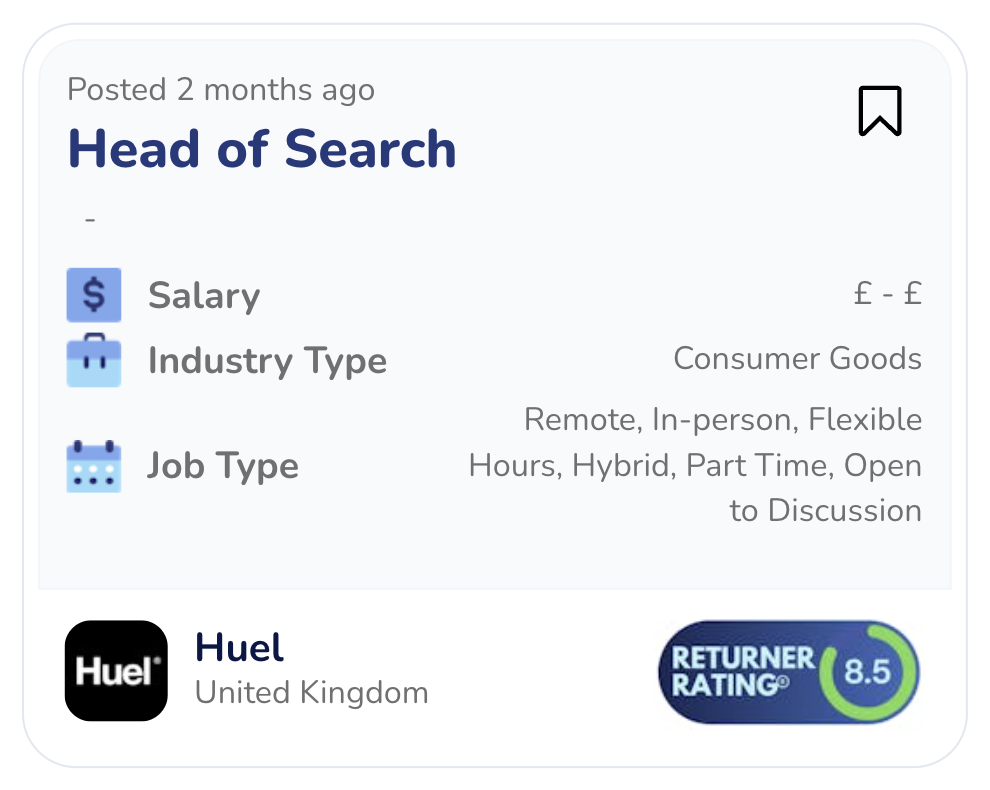Is your New Years Resolution to return to work? Well you're in the right place. With the kids going back to school, you might feel like you’ve got a bit more time on your hands (finally!), and some more time to think about yourself. If you're now considering returning to work, we know just how daunting this can be. Whether you’ve been home for a few years or just took a short break over the holiday period, transitioning from full-time parent to professional comes with its challenges. In this post, we’ll explore strategies to help you prepare for your return-to-work journey, all the way from initially identifying your career goals, to that all-important interview.
Identifying your career goals and job opportunities
As you prepare to return to work, it’s essential to take a step back and identify your career goals. Whether you’re looking to continue in your previous field or explore new opportunities, having a clear sense of direction will guide your job search and decision-making.
In this section, we’ll explore how to reassess your professional aspirations, identify the skills you’ve gained during your time off, and find job opportunities that align with your goals and lifestyle. Defining your path now will set the foundation for a successful and fulfilling career ahead.
Understanding the current job market
The current job market is dynamic and ever-changing, influenced by several key trends and factors:
Remote and hybrid work:
- The pandemic has accelerated the adoption of remote and hybrid work models, and this trend continues in 2024. Many companies, especially in sectors like technology, marketing, and finance, offer remote work options as part of their standard practices. This flexibility is particularly beneficial for parents returning to work, as it allows for better work-life balance.
Industry growth areas:
- Certain industries are experiencing significant growth. For instance, technology sectors such as cybersecurity, artificial intelligence, and data science are booming. Healthcare remains a strong field, particularly with roles in mental health services, telemedicine, and health tech. E-commerce and digital marketing are also seeing continued expansion, driven by the ongoing shift towards online shopping and digital interactions.
Skills in demand:
- Employers are looking for candidates with specific in-demand skills. Digital literacy, including proficiency in tools like Microsoft Office, Google Suite, and CRM systems, is essential. Additionally, skills in data analysis, digital marketing (SEO, content marketing), and coding (Python, SQL) are highly sought after. Soft skills such as communication, adaptability, and leadership remain critical, especially in remote work environments.
Wage growth and economic factors:
- With inflation affecting the cost of living, there is a notable push for higher wages across many sectors. However, wage growth varies by industry and location. High-demand sectors, such as technology and healthcare, tend to offer competitive salaries. It’s essential to research salary trends in your industry and region to ensure you’re targeting roles that meet your financial needs.
Diversity and inclusion:
- There is a strong focus on diversity, equity, and inclusion (DEI) in hiring practices. Companies are actively seeking to diversify their workforce and are more open to candidates who have taken career breaks, particularly those related to family responsibilities. This trend presents an excellent opportunity for parents returning to work.
Identifying your career goals
Identifying your career goals is the next crucial step in your return to the workforce. Start by asking yourself the following questions:
What do you want from your career?
Reflect on what you truly want from your career at this stage in your life. Are you seeking stability, a challenge, flexibility, or perhaps a chance to make a difference? Your goals might have shifted since you last worked, so take the time to reassess.
1
What are your long-term objectives?
Consider where you want to be in 5 or 10 years. Do you aspire to climb the corporate ladder, start your own business, or pivot into a new industry? Long-term objectives help guide your immediate job search and professional development efforts.
2
What role does work play in your life?
Balance is key. Determine how your career fits with your family life and personal aspirations. If flexibility is crucial, you might prioritize roles that offer remote work or part-time options. If financial security is your top priority, focus on high-paying industries or roles.
3
Which industries or roles align with your skills and interests?
Match your skills and interests with industries that are growing and have job opportunities. For example, if you have a background in healthcare and enjoy technology, you might explore roles in health tech or telemedicine.
4
Understanding your career goals
Personal values
- Your career goals should align with your core values. If work-life balance is essential, ensure that your goals reflect this. For instance, if you value helping others, you might focus on roles in social work, healthcare, or non-profit organisations.
Strengths and passions
- Understanding your strengths and what you’re passionate about is crucial. These elements should be at the core of your career goals. For example, if you excel in communication and have a passion for storytelling, a career in marketing or public relations might be ideal.
The bigger picture
- Think about how your career goals fit into the broader context of your life. How do they impact your family, your personal development, and your future aspirations? Ensure that your goals are not just career-focused but also contribute positively to your overall life satisfaction.
- Your career goals should be flexible enough to adapt to life’s changes. As your children grow, your priorities might shift again, and your career goals should be able to accommodate these changes.
Refreshing your CV
CV Best Practices:
- Keep it brief: Aim for 1-2 pages, focusing on relevant experience.
- Use action verbs: Start bullet points with strong verbs like “managed” or “developed.”
- Quantify achievements: Use numbers to show impact (e.g., “Increased sales by 20%”).
- Professional layout: Keep it clean and easy to read with simple fonts.
Structuring your CV:
- Contact info: Include your name, email, phone number, and LinkedIn profile.
- Opening statement: Briefly summarise your key skills and what you’re looking for.
- Work experience: List in reverse order, highlighting responsibilities and achievements.
- Education & skills: Include your highest degree, key hard/soft skills, and any certifications.
Using ChatGPT:
- Refine bullet points, generate ideas, and optimise keywords for Applicant Tracking Systems.
- ChatGPT can be used to tailor your CV to each job application using the keywords from the job description.
Addressing career breaks:
- Be honest: Clearly explain your break, focusing on skills gained during that time.
- Highlight experiences: Include relevant volunteer work or personal projects. Examples include involvement in committees, sports, or organisational achievements.

Download our free CV template specifically for returners:
Our hybrid CV template is over twice as likely to get chosen by a hiring manager
How to write a cover letter
Structure:
- Header: Include your contact info, date, and employer’s details.
- Greeting: Address the hiring manager by name if possible, or use “Dear Hiring Manager.”
- Opening: Introduce yourself, mention how you found the role, and why you’re a strong fit.
- Body: In 2-3 paragraphs, highlight relevant experience and achievements from your CV.
- Closing: Reaffirm your interest in the role and invite the employer to contact you.
- Signature: Sign off with “Sincerely” and your full name.
Using ChatGPT:
- Draft, personalize, and proofread your cover letter using ChatGPT for clarity and style improvements.
Personalizing for Applications:
- Research the Company: Mention specific company details or projects.
- Align Skills: Tailor your skills to the job description.
- Show Enthusiasm: Express your passion for the role and company.
Mistakes to Avoid:
- Don’t send generic cover letters, repeat your CV, or include errors. Keep it concise, professional, and relevant to the role.
By following these steps, your cover letter will be more impactful and personalized for each application.
Ready to Return to Work?
Sign up to our Return to Work Bootcamp, where you’ll receive a personal CV review and more.
Searching for jobs and using LinkedIn
Your LinkedIn presence:
- Update profile: Ensure your experience, skills, and photo are up to date. Use a headline that reflects your goals.
- Write a strong summary: Keep your summary concise, showcasing your skills and career aspirations.
- Highlight skills: List key skills and get endorsements to boost visibility.
- Engage and network: Share content, comment, and join relevant groups to stay active and expand your connections.
Job search strategies:
- Set goals: Define your ideal job in terms of industry, role, and location.
- Use multiple platforms: Explore LinkedIn, Indeed, and industry-specific sites. Set job alerts for new postings.
- Tailor applications: Customise your CV and cover letter for each job.
- Network: Leverage your connections and attend events to uncover job leads.
- Track applications: Keep a record of all your job applications to follow up effectively.
Finding flexible work:
- Search remote roles: Use filters on job boards to find remote or hybrid positions.
- Consider part-time or contract work: If full-time work isn’t feasible, explore flexible options.
- Research family-friendly companies: Look for organisations with flexible policies and a supportive culture.
- Use your network: Tap into your network for leads on unadvertised flexible jobs.
By using these strategies, you can improve your job search outcomes and find a role that aligns with your career and personal needs.
Interviewing and Negotiating
Navigating interviews and salary negotiations can feel daunting, but being well-prepared can make all the difference. In this section, we’ll cover key strategies to help you shine during interviews and confidently negotiate your flexibility, salary, and benefits, ensuring you secure a role that aligns with your professional and personal needs.

Join the ivee community!
Join our Facebook group. Whether you’re looking to reconnect with like-minded returners, seek advice on returning to work after maternity leave, or share your experiences, our Facebook community is here to help you navigate your journey back into the workforce.
You’ll find:
👉 Latest regulatory changes regarding maternity leave
👉 CV templates for women returning to work
👉 Latest industry updates
👉 Resources and guides to help you on your job hunt
👉 Confidence-building events, webinars and advice on all aspects of returning to work
Our Facebook community
Conclusion

Returning to work in the New Year is a significant milestone, but with the right preparation, it can be a smooth and rewarding transition.
By identifying your career goals, updating your CV, strengthening your LinkedIn presence, and preparing thoroughly for interviews and negotiations, you’ll set yourself up for success. Remember, this is a new chapter filled with opportunities to showcase your skills and build a fulfilling career. With confidence, planning, and the support of your network, you can navigate this journey and achieve your professional goals while maintaining a healthy work-life balance.
Featured Blog Posts
Check out the latest blog posts from ivee
Ready to Return to Work?
Sign up to our Return to Work Bootcamp, where you’ll receive a personal CV review and more.










